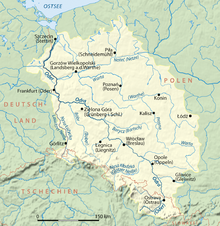International Commission for the Protection of the Oder against Pollution
The International Commission for the Protection of the Oder against Pollution ( IKSO ) is based on a multilateral agreement between Poland , the Czech Republic , the Federal Republic of Germany and the European Community , which was signed on April 11, 1996. After ratification by the contracting parties, the agreement entered into force on April 26, 1999.
aims
According to Article 2 of the Treaty on the International Commission for the Protection of the Oder against Pollution of April 11, 1996, the Commission pursues the following objectives in particular:
"A) to prevent pollution of the Oder and the Baltic Sea with pollutants and to sustainably reduce pollution ,
b) to achieve the most natural aquatic and related terrestrial ecosystems with a corresponding biodiversity ,
c) to enable uses of the Oder, especially the extraction of drinking water from bank filtrate and the agricultural use of the water and sediments . "
Organization and financing
The decision-making body is the commission, which is composed of delegations from the contracting parties. The commission is supported in its work by a secretariat, which is based in Wroclaw , as well as by working groups for certain subject areas.
The work of the commission is financed primarily through the contributions of the contracting parties . Germany and Poland each contribute 38.75 percent of the budget, the Czech Republic 20 percent and the European Community 2.5 percent. In addition, donations , subsidies and interest contribute to the financing of the IKSO.
Web links
- International Commission for the Protection of the Oder against Pollution
- Text of the treaty on the International Commission for the Protection of the Oder against Pollution
bibliography
- ↑ a b IKSO founding act, goals and working method (accessed on December 6, 2008)
- ↑ a b c d Treaty on the International Commission for the Protection of the Oder against Pollution (accessed December 6, 2008)
